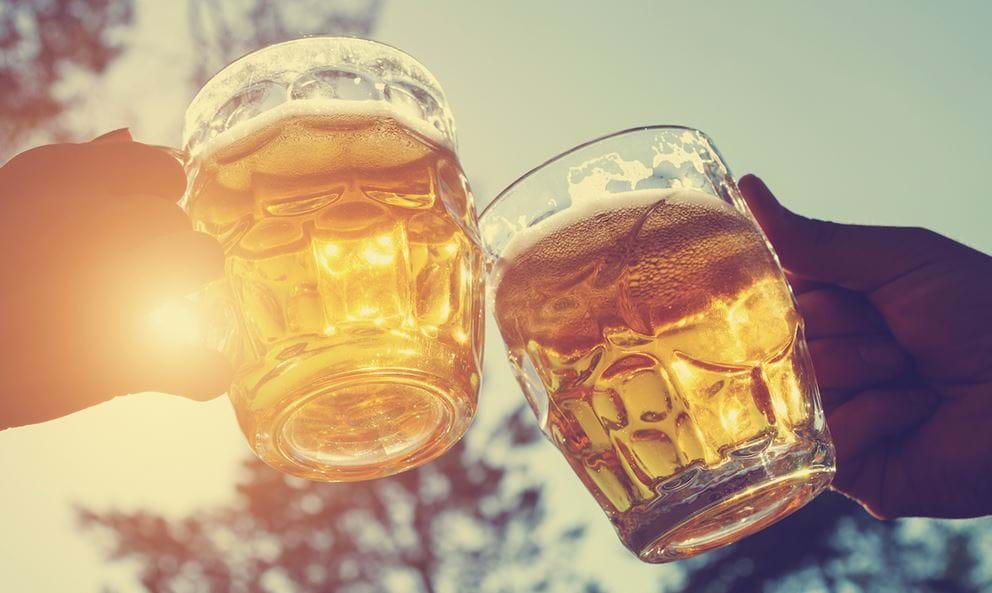Don’t let alcohol sabotage your summer body

The problems
Alcohol’s full of calories
Everyone’s aware that a dark beer or a jack and coke is pretty chock-full of calories.
There’s a common misconception, though, that pure spirits like vodka are calorie-free due to the absence of other ingredients. Unfortunately, it doesn’t quite work that way.
Believe it or not, alcohol is actually a “macronutrient” (just one that your body doesn’t need or want), with 7 calories per gram. That’s almost twice as many calories per gram as either protein or carbohydrates.
According to the USDA food database[1]:
A 25ml shot of vodka contains 54 calories
A 25ml shot of whisky contains 59 calories
1 pint of beer contains 208 calories
A 120ml glass of red wine contains 101 calories
A 120ml glass of white wine contains 97 calories
Alcohol messes up your nutrient absorption
Research has conclusively shown that alcohol wreaks havoc on the body’s ability to absorb nutrients. This is done via a variety of different mechanisms, including reducing water, sodium and chloride transport in the small intestine.[2]
All fitness goals – fat loss, muscle gain, or anything else – depend largely on the overall health of the body and its organs. That, to a large extent, depends on getting the right nutrients in your diet and being able to digest them.
Alcohol completely wrecks your hormonal balance
The sad fact is that one of the worst things you can do for your hormonal health is to get drunk. The research shows[3] that alcohol has a profoundly negative effect on the ability of the body’s endocrine system to communicate with the nervous system, immune system, and circadian mechanism.
The effects of this can range from poor recovery, poor heart and organ health, reproductive problems, thyroid problems, immune disorders and more.
While these effects apply, particularly, to chronic alcoholics, they should give you a good idea of why going out on a binge isn’t going to help you get in shape.
Alcohol can disrupt your sleep
Although there’s evidence that alcohol can help you fall asleep – and maybe even sleep more deeply at the beginning of the night – it also has the ability to disrupt the later and deeper parts of sleep which are critical to the body’s well-being.
The same research suggests that alcohol can exacerbate daytime sleepiness, and that tolerance to its sedative effects quickly builds up with regular use – meaning it’s all downhill.[4]
The solutions
Hangovers keep you out of the gym
Enough said. Hangovers have a pretty notorious ability to make you waste an entire Saturday or Sunday in bed, feeling bad, eating crisps and skipping the gym. Even if you do make it down for workout session while hungover, you’re not likely to achieve great things.
Clear spirits and diet mixers are your friends
Sticking to clear spirits and diet mixers is probably one of the best strategies to stick to when you go out drinking.
Not only do these have fewer calories than other drinks, but they also have fewer harmful compounds which could contribute to a hangover.
These compounds are called congeners – and are toxic by-products of fermenting and distilling.
As a general rule of thumb, clear drinks have few congeners, dark drinks have lots. Vodka has practically none, while bourbon has plenty.[5]
By reducing empty calories and the intensity of your hangover, alone, you’ll be doing your fitness goals a favour.
Moderation always wins
It’s been said a million times, by a million different people, but when it comes to sticking to your fitness goals, practising some moderation with your drinking really is the best policy.
The problems with alcohol tend to start small and increase dramatically with the amount you drink. The drunker you get, the more damaged your body becomes, and the more you’ll struggle to obtain or maintain that dream physique of yours.
Try an espresso after leaving the pub
Although earlier studies failed to find any significant interaction between caffeine and alcohol, more recent research suggests that caffeine may help to reduce the effects of drunkenness and help with the withdrawal effects too. To quote a 2011 study[6]:
“Caffeine may provide a “treatment” for the withdrawal effects of alcohol by blocking the effects of upregulated A1 receptors.”
You probably don’t want to down a pot of coffee when arriving home from a night out. If you’ve been having some daytime summer drinks, though, a double espresso afterwards may help you win the fight back against the booze.
Stay hydrated
The obvious advice. Alcohol dehydrates you. Your body needs water to survive and thrive. Remaining in a dehydrated state not only makes you feel terrible, it also ruins your performance in the gym, and interrupts your body’s normal functioning.
Drink water between alcoholic beverages.
[1] https://ndb.nal.usda.gov/ndb/search/list
[2] http://onlinelibrary.wiley.com/doi/10.1111/j.1753-4887.1977.tb06477.x/abstract
[3] https://www.ncbi.nlm.nih.gov/pmc/articles/PMC3767933/
[4] https://www.ncbi.nlm.nih.gov/pubmed/11584549
[5] https://www.ncbi.nlm.nih.gov/pubmed/20712591
[6] https://www.ncbi.nlm.nih.gov/pmc/articles/PMC3621334/


